Greak: Memories of Azur is a team-based adventure platformer where I guide a trio of siblings across a crumbling fantasy kingdom in pursuit of escape and safety. I play as a young boy named Greak, his older sister Adara, and oldest brother Raydel. The family are Courines, an elf-like race whose bodies glow with a perpetual inner light. The Courines inhabit a land called Azur which is under siege by the Urlags, a bestial army armed with vicious weapons who come from across the sea to pillage and conquer.
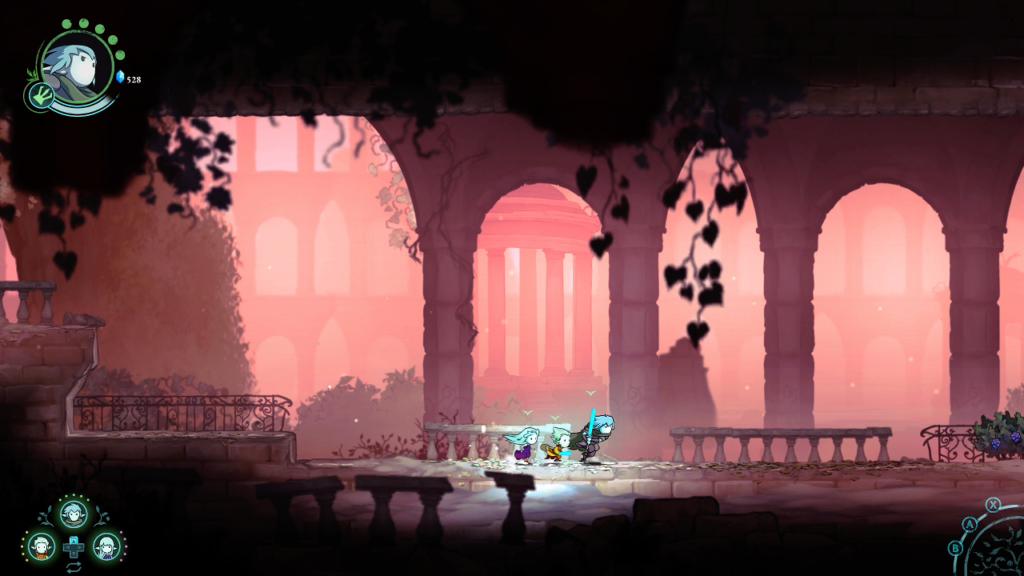
With each Courine temple the Urlags sack, they also destroy its powering crystal which holds back an ancient plague festering in Azur’s earth. The plague causes the land itself to rise as zombies made of pitch and mud. With the Urlags on one side and the plague horde on the other, the Courine’s temples, fortresses, and cities in Azur are steadily destroyed. As the story begins, only one Courine village still stands and its residents have a final, desperate hope: an airship which can carry them away from Azur. I must help Greak and his siblings travel around the countryside in search of parts to complete the airship that will carry the few surviving Courines to a new home.
Greak: Memories of Azur’s main conceit is that a single player controls the three player characters at once to solve puzzles and fight enemies. The siblings have different attributes which make them distinct and more or less useful in different situations. Greak, the youngest and most adventurous sibling, can squeeze into spaces too tight for his older relatives. Adara, the middle and most mystical sibling, can use the powers she learned from the Oracles to float and swim long distances underwater. Raydel, the oldest and most responsible sibling, can use his hookshot to pull himself to high ledges and also wields an indestructible shield—which is so heavy he sinks instantly in water.
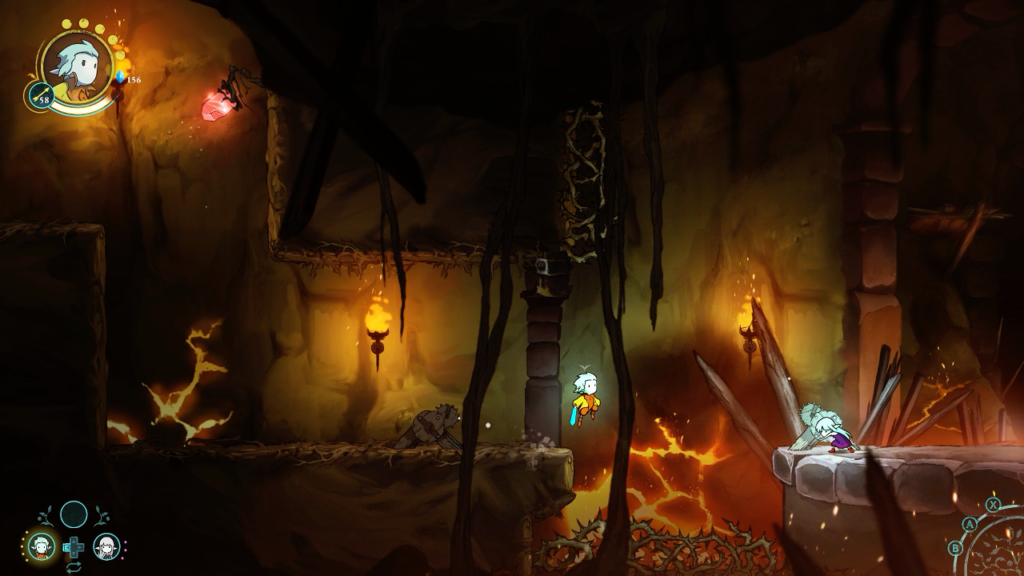
By using the directional pad to switch between the siblings, I can build their abilities off of each other to traverse the environment. I may come across a doorway guarded by a deadly laser beam. I need to use Raydel’s shield to block the laser, but he must ride an elevator to reach the door. The elevator is presently inactive. Nearby, I find a crevice I can squeeze through with Greak which leads to the lever that activates the elevator, but the lever is blocked by another barrier. Beneath the barrier I see a switch at the end of a long underwater tunnel. Exploring with Adara, I find the underwater tunnel’s entrance. I activate the underwater switch with Adara to remove the barrier, activate the lever with Greak to turn on the elevator, and ride the elevator with Raydel to block the laser with his shield, letting all three siblings access the door on the other side.
Greak: Memories of Azur finds a lot of variations on this puzzle throughout its duration and I was charmed by most of them. They made me feel smart for solving them, but not overwhelmed or confounded by their intricacy. By spending a few minutes looking at the many objects Greak, Adara, and Raydel can interact with, I quickly deduce the order and timing in which to use their abilities. Soon enough I’m sending the siblings off to their next destination and the next puzzle.
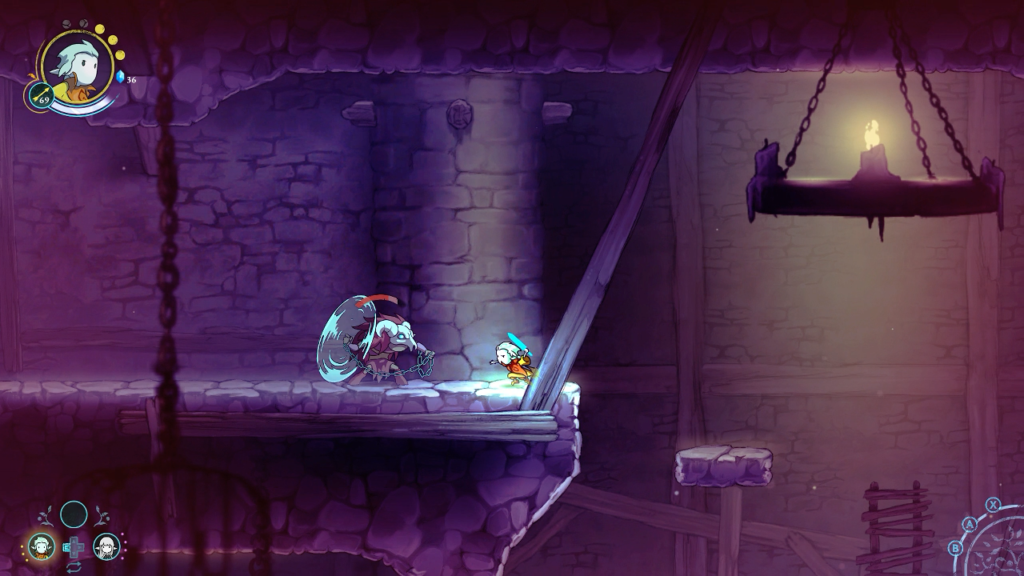
The siblings are similarly disparate in their combat skills. Adara is the most unique, able to fire magical projectiles a short distance that are powered by a quickly-refilling stamina meter. Greak and Raydel both wield swords in combat. Greak’s smaller frame may let him avoid some attacks, but he deals less damage and has shorter range than the older, stronger Raydel. Each can hold their own in combat and they even do a decent job autonomously defending themselves from enemy attacks when my focus is on another player character.
Where I do experience some difficulty is controlling all three siblings simultaneously. I am often called to move the three player characters across an environment whose puzzles I have already solved. By holding down the left trigger I can compel the siblings to move together, running and jumping across pits and over platforms as one. It’s a good idea in theory, but in practice it’s undermined by each player character’s unique jumping skills.
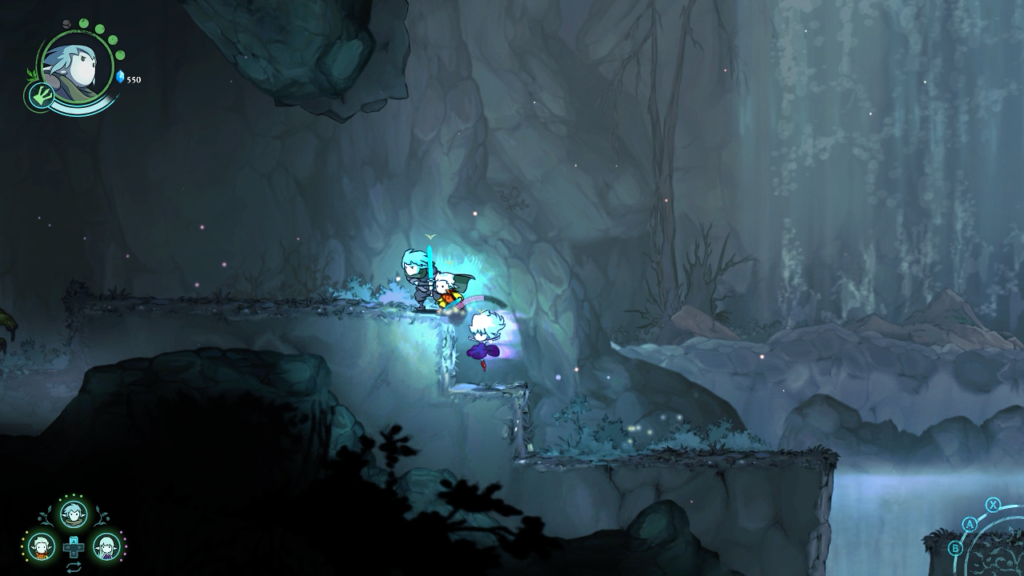
Greak and Raydel can both double jump in typical adventure platformer fashion and keeping them in step is effortless. Adara’s more unconventional floating ability lets her cover the same ground as her brothers, but she also moves much slower while using it.
I am left with a choice: Guide the siblings one at a time to their destination, or move them as a group and take breaks after every big jump to allow Adara to catch up with Greak and Raydel. I can take all the backtracking endemic to adventure platformers and either multiply it by three or drag down the pace while filling it with lots of extra micromanagement. Whichever choice I make becomes tedious quickly.
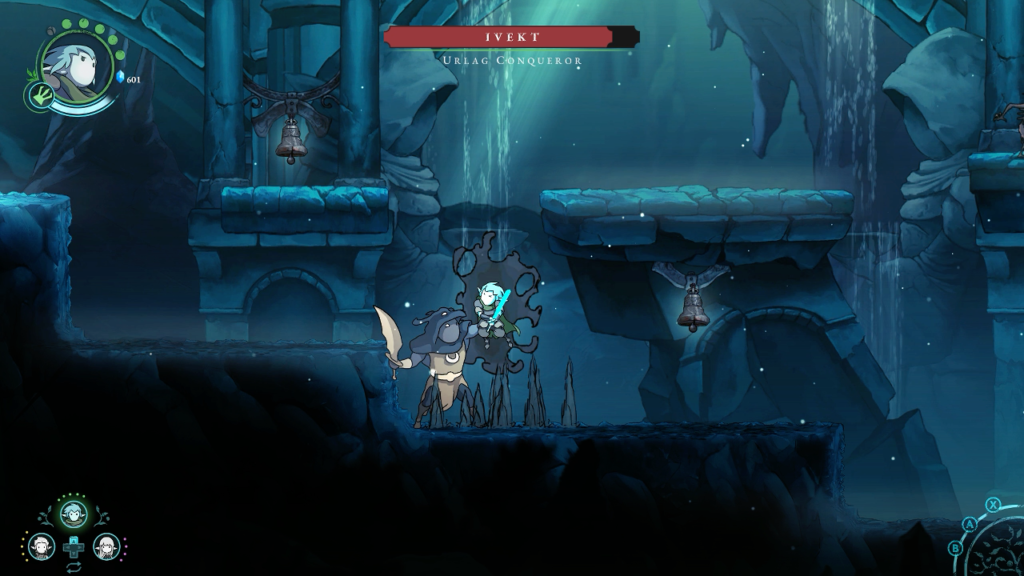
I worried that this same problem would make controlling the siblings against bosses challenging. I am surprised to discover the contrary, as none of the bosses challenge my management abilities. Usually I can place all my focus on a single player character and not worry about what’s happening to the other two.
As an example, one boss fight is against an Urlag Conqueror named Ivekt who can wrap the siblings up in mud bubbles. I can free a trapped sibling by attacking the bubbles, but if all three are bubbled at once then I get a game over. Ivekt’s glaring weakness is that he has zero ranged attacks. I allow him to bubble Greak and Raydel, focusing on sniping him with Adara’s projectiles and freeing her brothers when I pass by them for some extra security. I don’t need it. Ivekt succumbs to Adara’s magic with little effort.
Controlling the siblings as a group can be a chore, but thankfully none of the environments are intricate enough that I need to worry too much about mistakes—and the same is true of the bosses.
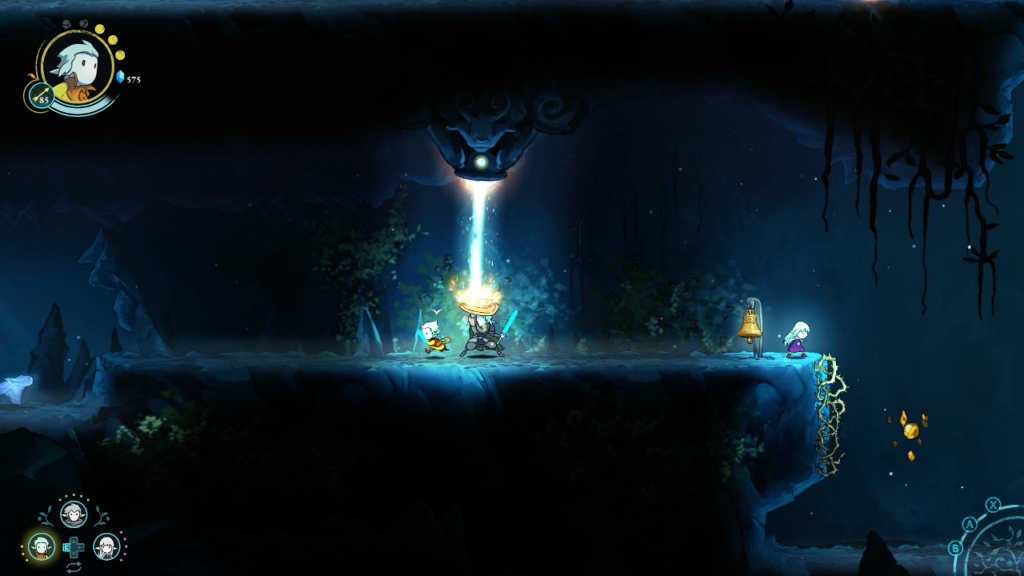
Greak: Memories of Azur is an old style of puzzle-platforming design, used most triumphantly in The Lost Vikings and Trine. Where those videogames are linear and level-based, Greak: Memories of Azur is set in an open adventure platforming environment. Instead of needing to find a new ability or key to access a platform that Greak cannot reach on his own, I must return with Adara and Raydel to solve previously unsolvable puzzles. This conceit creates a promise of a grand adventure, filled with vast interlocking puzzles that exist as smaller parts of a greater whole.
This promise goes lamentably unfulfilled and that comes down to how Greak: Memories of Azur is structured. It’s heavily mission-based. It begins with Greak waking up in Raven’s Road Camp, seemingly the last outpost of the Courine civilization left in Azur. He is charged with gathering rope from the nearby forest to stock on the airship. He succeeds, and is given another mission to gather more material for the airship slightly further out of town. There, he reunites with Adara, and the pair return to Raven’s Road Camp and are given another mission. Rinse and repeat until the airship is complete and the videogame ends.
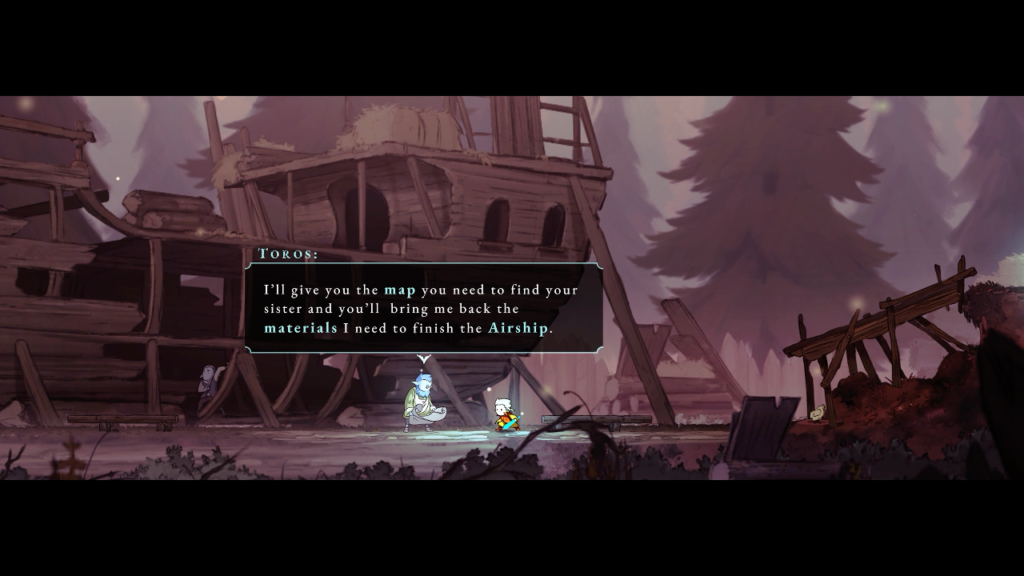
This mission-based structure has its strengths. I’m never at a loss on where the siblings need to go and what they need to accomplish once they get there. Every time the siblings return to Raven’s Road Camp, the NPCs change to reflect the evolving plot. I especially feel it as the situation grows more and more dire; the shopkeeper who charges Greak exorbitant sums at the beginning soon abandons his stall as the Urlag army draws closer. By the climax his replacement resorts to literally giving away what little stock is remaining as there doesn’t seem to be a point in selling it anymore. Little touches like this give a great sense of progress, momentum, and dire stakes.
Yet this mission-based structure does not complement the adventure platformer structure. Not being sure where I need to go or what I’m meant to accomplish next is what puts the “adventure” in the adventure platforming genre. Rather than having a world to explore, I am essentially forced to retread ground I’ve already traversed multiple times to get to the next level which has already been marked on my map by Toros the Airship Builder.
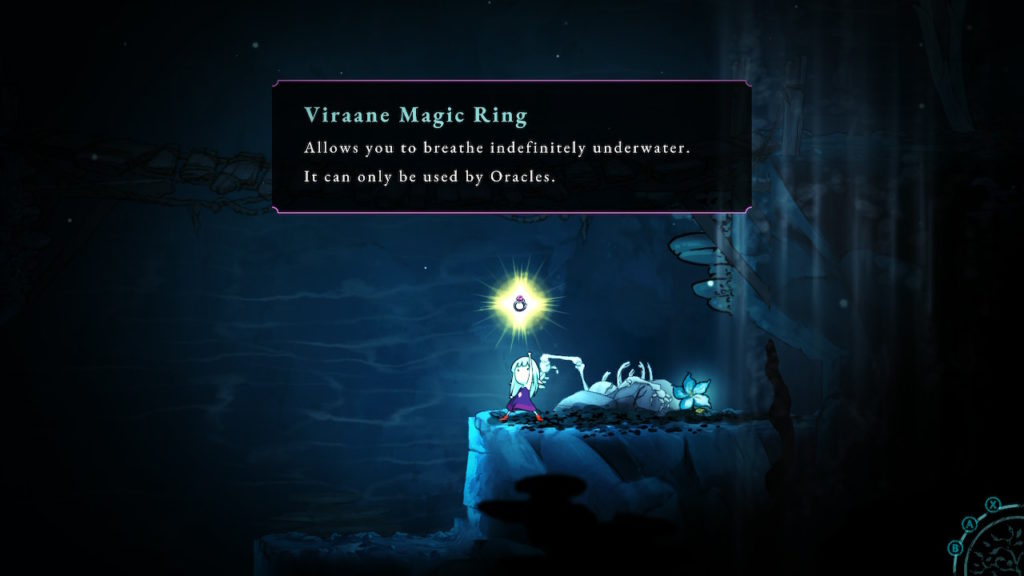
Retreading already-explored space is endemic to adventure platformers. It may even be their entire point. Normally I am rewarded for this retreading with new powerups to increase the player character’s strength and hit points. Azur isn’t devoid of new powerups to discover, but it’s not overflowing with them either. There is exactly one hit point upgrade to discover for each sibling. Greak and Adara also have a handful of discoverable utility upgrades, only one of which actually feels game changing. Raydel has almost no upgrades at all.
A relative lack of things to discover is a consequence of length. Azur is tiny, so there’s no room to hide things. Raydel has so few upgrades because by the time he reunites with his siblings the videogame is already almost over. There’s nothing wrong with a videogame being brief, and I often prefer them to be quick and to-the-point. This doesn’t feel brief. It feels short and perfunctory.
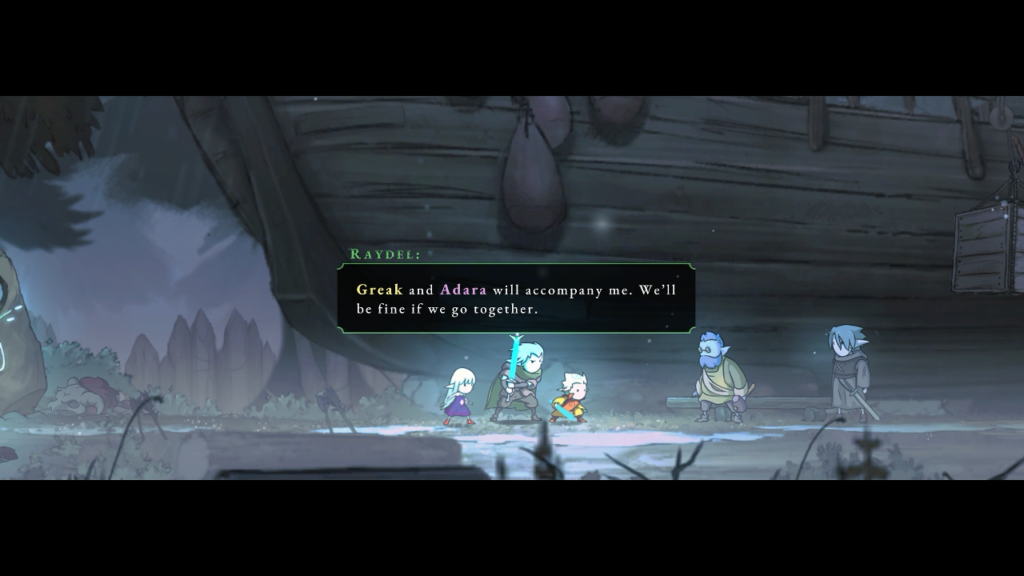
I can’t complain that Greak: Memories of Azur feels incomplete. It tells a full story; Greak must find his lost siblings, build an airship, and escape from Azur before the Urlags overrun their fortified camp. It captures its design conceits; three siblings with different-but-complementary powers must join forces to solve puzzles and defeat enemies. But the story feels like it ends mid-thought, as though the siblings escaping to the new Courine homeland is only the first act of a three act story. The design feels similarly rushed, ending just as it feels like it’s beginning to capitalize on its ideas. Once Raydel joins the party there’s only two missions left to complete with the full party.
I like almost everything about Greak: Memories of Azur except the profound sense it leaves within me that there should be much more.
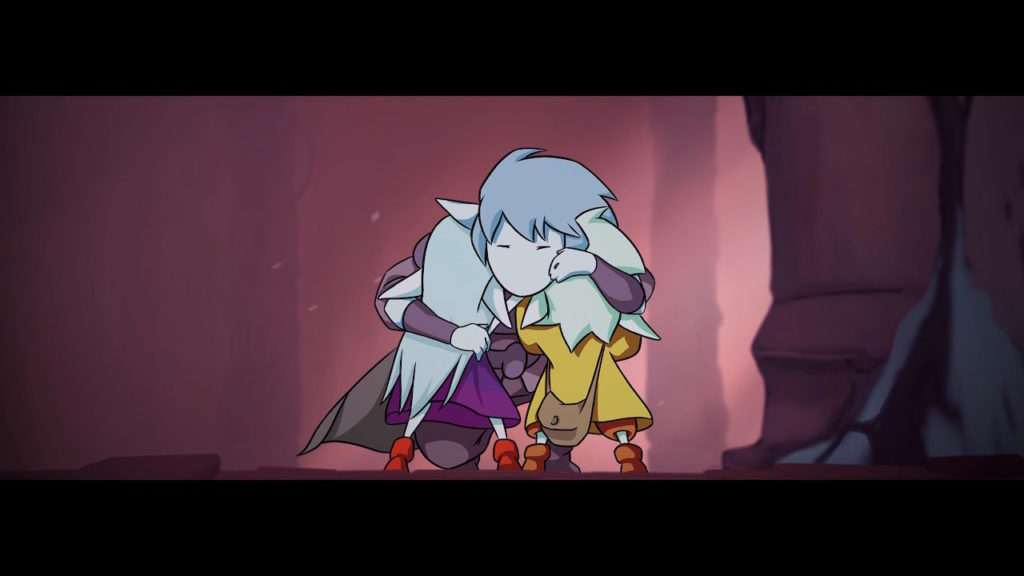
Greak: Memories of Azur’s problem is it’s an adventure platformer that isn’t interested in being an adventure platformer. I love the idea of expanding team-based puzzle platforming across an entire continent. That continent is small and has few reasons to revisit its scant areas. I love the idea of trying to scrounge the parts to build an airship in a sprawling open environment. A quest giver in town points me exactly where I need to go next and what I need to find there. I love the intricate and smart-but-not-too-smart puzzles. The videogame ends before I’m satisfied all its ideas have been explored. It’s not enough to just love ideas. I have to love execution as well.
I’m left with only the beautiful hand drawn animation and the interesting setting to recommend Greak: Memories of Azur. It feels like the start of something much grander, a seed that needs more time for nurturing and growth before being unleashed upon the crowded indie adventure platformer marketplace. If that seed continues to grow into a stout sapling of a sequel, then I’m interested. But it’s hard to recommend a mere seed.